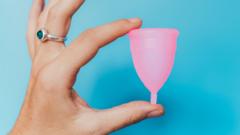A case of a woman experiencing temporary kidney issues due to a misaligned menstrual cup has prompted medical experts to advise on the correct usage, sizing, and positioning of these reusable devices to prevent adverse health effects.
Doctors Caution About Misuse of Menstrual Cups Due to Health Risks

Doctors Caution About Misuse of Menstrual Cups Due to Health Risks
Medical professionals warn women about potential health issues linked to the incorrect use of menstrual cups, highlighting the importance of proper sizing and alignment.
Recent medical reports have revealed a case where improper usage of a menstrual cup led to temporary kidney problems for a woman in her 30s. After suffering from intermittent pelvic pain and blood in her urine for several months, the patient discovered that her symptoms were linked to the misalignment of her menstrual cup. This case, noted by Danish doctors in the British Medical Journal, underscores the importance of selecting the right size and properly positioning menstrual cups to avoid potential complications.
Menstrual cups, fashioned from soft and flexible materials, serve as an eco-friendly alternative to traditional sanitary products like pads and tampons. Designed to collect menstrual blood, these cups can hold between 20 to 30 milliliters of fluid and can be emptied, cleaned, and reused over a cycle of four to eight hours, depending on individual flow intensity. Despite their benefits, selecting the proper size is essential, particularly for first-time users. Reports indicate that some newer users experienced difficulties in removing the cups, necessitating assistance.
Dr. Kate Lough, a physiotherapist specializing in pelvic health, recommends that users should be meticulous about how they insert and remove the cups. Notably, she advises against pulling the stem and suggests pinching the base to break the suction seal before removal. Many may require a few cycles to become accustomed to using these devices, and they should not experience pain when properly inserted.
Moreover, healthcare professionals highlight that menstrual cups can be purchased without medical consultation, reinforcing the need for accessible and comprehensive educational materials for users. Dr. Lough also noted scenarios where the presence of a contraceptive coil could interact with the use of menstrual cups, albeit at a minimal risk level. In such cases, women are advised to consult health professionals to ensure their coils remain in place.
In addition to menstrual cups, menstrual discs offer an alternative design and position themselves higher in the vaginal canal, just below the cervix. As the market for these products grows, health experts are encouraging users to remain informed about proper use and potential risks associated with improper sizing and positioning.




